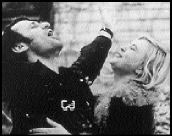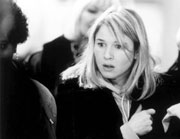First of all, it’s pronounced “loo-neh-seh,” and refers to Lugh, the pagan harvest god of music and light. Lugh is also the name of the wireless radio in the Mundys’ kitchen, where the five unmarried Mundy sisters and the youngest’s illegitimate son make their way. If Lughnasa sounds like the word “lunacy,” it’s no coincidence: Rosie Mundy (Sophie Thompson), the simple sister, dotes on her white rooster and fantasizes about being whisked away by the likes of a socially unacceptable man; Jack (Michael Gambon in a wonderfully doddering, amiable role), their priest brother who returns from decades in Africa as a missionary, wobbles around the homestead re-enacting tribal rituals and calling everyone by African names.
Each sister displays distinctive personality traits and plays them to the hilt. Kate (Meryl Streep) is the bossy “gander,” whose teaching job extends to her sisters. Maggie (Kathy Burke) sings show tunes and cracks off-color jokes. Agnes (Brid Brennan) keeps the home fires burning while checking her deeper emotions. Rose is sweet-natured and innocent. Christina, the beauty (Catherine McCormack), raises a “love child” whose father shows up whenever he feels like it.
In 1936, the Mundys are products of the Great War and sweeping unemployment, circumstances that made for slim marriage pickings in the town of Ballybeg. In the summer of 1936, however, men surround the Mundys. Gerry Evans (Rhys Ifans), the boy’s father and an accomplished ballroom dance instructor, returns; Father Jack stays; and no-good Danny Bradley secretly woos Rose.
In a country where strict Catholic mores clash with an array of pagan deities, the Mundy women are caught between the practiced modesty of their gender and the remembered freedom of movement through dances they used to attend in their youth. In a climactic scene, they rediscover this physical joy, when the radio gets fixed and a reel comes in over a clear frequency. One by one, the sisters move around the kitchen table in rhythm, each tapping their feet and giving themselves over to the music until they are sashaying and whooping outside. The men, bewildered, look on through windows, excluded from their jubilance.
If there is a fault to be found with Dancing at Lughnasa, it certainly isn’t with the actors, whose fully drawn characters are wonderful to watch as they bump up against each other. The problem lies in the story itself. We’re offered scene after scene of magnificent bumping, but as the narrator points out early on, this particular summer began a chain of irreparable events. Once something interesting finally does happen, the film ends in the same place it started: Things won’t ever be the same. We are denied the pleasure of seeing these women move past their home setting and struggle in the real world. This is one of those times when they should have just kept on going.







